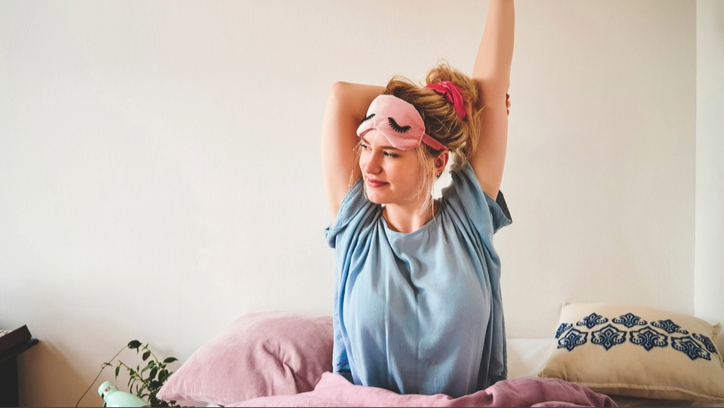Why you should join the 5am club and how to do it without losing sleep, according to a doctor
It's the wake-up time of wellness gurus and high-performers, but should you join the 5am club too?

Being a morning person is taken as a pillar of success in our wellness-forward productivity-obsessed society. We know sleeping on the best mattress for your sleep needs and getting plenty of quality ZZZs are key to maintaining good health and performing well, but prestigious individuals across social media and in the public eye are shouting about how an early morning is the key to a successful lifestyle. So, how do you find a balance between getting enough sleep and rising early?
It's really about listening to your body and doing what's best for you — not just following what's trendy at the moment
Dr Leah Kaylor
The release of Robin Sharma's book The 5am Club in late 2018 began the idealisation of 5am as the golden wake-up time in modern society. Since then, 5am has been associated with ambition, discipline and success. Wellness gurus like Gwyneth Paltrow and Jennifer Anniston joined the early bird club alongside tech moguls like Facebook's Mark Zuckerberg and Apple's Tim Cook. Now, more and more people are striving to be one of the elite superbeings who rise at 5am under the guise that it will revolutionize not only their productivity and wellbeing, but also their happiness.
To a certain extent, there is good reason (and reliable science) backing this early wake-up time. But experts, including clinical and medical psychologist Dr Leah Kaylor, don't recommend you sacrifice quality sleep in pursuit of an Instagram-worthy morning routine. Here's how to join the coveted 5am club without losing sleep or energy.
What are the benefits of waking up at 5am?
There is plenty of research that concludes waking up earlier can help you live a happier, healthier life. One study in particular found that waking up just one hour earlier than usual reduces a person's risk of developing depression by 23%. But when you're dragging yourself from the warmth of your bed on a cold, dark morning, you're probably going to doubt that science, because is that really happiness?
Yet, once you've fought through the initial grogginess (also known as sleep inertia) of a 5am alarm, things look up. Waking up at this early hour gives you extra time to wake up slowly so you can adjust to a full wakeful state before starting your morning routine, fit in a morning workout, get chores done or take some time for yourself by journaling, stretching or simply sipping a quiet coffee. Alongside setting you up for a less stressful day, this frees up time to relax or socialise in the evening, helping you live a more balanced life.
However, Dr Kaylor says you should be aware of your chronotype. She says night owls will find it "challenging to consistently be a member of the 5am club" because "you will be working against what your body naturally craves."
5 ways to join the 5am club without zapping energy
Obviously you lose vital hours of sleep in the morning by rising at 5am. So, here’s what you can do to make sure you make up that sleep elsewhere and maintain your energy levels...
Sign up to get the BEST of Tom's Guide direct to your inbox.
Get instant access to breaking news, the hottest reviews, great deals and helpful tips.
1. Shift your bedtime earlier
An early morning calls for an early night. The most obvious way to ensure you don't miss out on essential sleep when shifting your wake-up time earlier is to ensure you shift your bedtime by the same degree to ensure you are still getting the universally recommended 7 to 8 hours of sleep each night.
If you're goal is to join the 5am club, but it's a big jump from your current alarm time, Dr Kaylor recommends gradually shifting your bedtime and wake time. She says: "Go to bed 15 minutes earlier and wake up 15 minutes earlier. Then continue to work in these 15 minute increments, until you reach your desired timeframe."
She explains that "this gradual movement will be much more gentle on the body compared to simply beginning to wake up at 5am." In time your body's internal clock will get use to your new sleep schedule.
2. Get up and at 'em
Yes, you can be one of those smug 5am-risers who complete a workout, eat a nutritious breakfast and turn up at the office with a spring in their step by 9am. While you might think a morning run or gym session is more energy-draining than energy-boosting, science shows the opposite is true.
Doctors at Harvard Medical School explain: "Exertion spurs your body to produce more mitochondria inside your muscle cells. Mitochondria are known as the powerhouses of cells, because they create fuel out of glucose from the food you eat and oxygen from the air you breathe. Having more of them increases your body's energy supply."
This means exercise promotes oxygen circulation inside your body, making it use energy more efficiently. Plus, you get a boost of 'feel-good' hormones when you move your body, making you feel energized.

Furthermore, some studies show morning exercise can improve sleep quality, while other research shows it can improve cognitive function. Together, these benefits result in improved physical and mental energy throughout the day.
3. Expose yourself to sunlight
Exposing yourself to light in the morning can help regulate your circadian rhythm and energy levels. Researchers at the American Academy of Sleep Medicine say that light is the most powerful signal to your body that it's time to wake up. This is because light suppresses the sleepy hormone melatonin and boosts the alertness hormone cortisol, resetting your internal body clock.

Since getting natural daylight at 5am may be an impossible task, we recommend shopping one of this year's best sunrise alarm clocks. By simulating a sunrise inside your bedroom, these gadgets can help you wake up gradually and with more energy on dark mornings.
4. Time your meals
Earlier wake-up calls and bedtimes will mean you'll need to shift your meal times to sustain energy and avoid the consequences of late night meals. Studies show eating close to bedtime can worsen issues such as acid reflux, indigestion and heartburn, which wreak havoc on your sleep.
When you wake up at 5am, you’ll need to eat breakfast earlier to give you a morning energy boost. Therefore, you should shift your mealtimes earlier for the rest of the day and be especially mindful of evening meals and snacks. The expert-approved 10-3-2-1-0 sleep rule says you shouldn't consume food within 3 hours of going to bed if you want to fall asleep fast and get quality, restorative sleep.
5. Power nap
We always recommend getting a solid 7 to 8 hours of sleep each night to maintain good health, physical performance and mental function and ensure you have energy throughout the day.
But if life gets in the way of your early bedtime and you still want to get the benefits of waking up early, a daytime nap won't do any harm. If your schedule affords a spare 20 minutes or so, a power nap can help you 'pay back' sleep debt, giving you an energy boost.
It is important to note that napping is a short-term solution and should only be used if you have the occasional night of less sleep. If your work or social schedules don't align with a 5am wake-up call, we recommend you avoid them altogether.
Ending up sleep deprived or burnt out is no way to lead the successful life that the 5am club promises. As Dr Kaylor explains: "If you join the 5am club, but you are functioning on only 4 hours of sleep, you certainly will not be performing at your peak and eventually your brain and body will pay the toll."

How does waking up early impact energy?
Granted, you’re unlikely to feel energised immediately upon waking at such an early hour. But, with planning and providing you get ample sleep, waking up at 5am can positively impact your energy levels. Doing something that will increase cortisol upon waking, like exposing yourself to sunlight exposure or exercising, can improve your cognitive function and boost your natural energy levels by the time you go to work and carry on with your day.
The early wake time will mean, however, that your energy drops earlier in the evening. So, it's best you use this time to relax and wind down ready for an early night. If you find your energy crashing too early in the day, perhaps when you are still at work or fulfilling other responsibilities, Dr Kaylor says it is not always worth forcing yourself to wake up at 5am. She says: "It's really about listening to your body and doing what's best for you — not just following what's trendy at the moment."

Eve is a PPA-accredited journalist with an MA in Magazine Journalism from Cardiff University. She is a Sleep Staff Writer at Tom’s Guide and has four years’ experience writing health features and news. She is particularly interested in the relationship between good sleep and overall health. At Tom’s Guide Eve is responsible for coverage and reviews of sleep tech and is our smart and cooling mattress specialist, focussing on brands such as Eight Sleep and Sleep Number. She also covers general mattress reviews, seeks out the best deals to produce tried-and-tested buyer's guides for sleep accessories and enjoys writing in-depth features about sleep health. She has been involved in rigorous testing procedures for mattress reviews in our Sleep Studio and has interviewed experts including sleep doctors and psychologists. When not covering sleep at Tom's Guide, Eve enjoys writing about health and fitness, food and culture.
